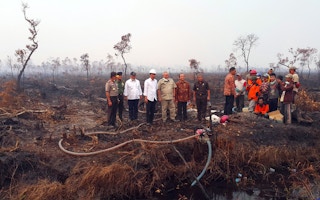With forest and peatland fires raging across large swaths of Indonesia, an oil palm developer in South Sumatra faces having its permit revoked after President Joko “Jokowi” Widodo paid one of his trademark impromptu visits to its concession on Sunday.
Wearing a white shirt and no mask, Jokowi shook his head as he surveyed the burned-out wasteland, where fires have consumed around 200 hectares, emitting a noxious haze.
He was accompanied by the head of the military and the National Police, the governor of South Sumatra and the head of Ogan Komering Ilir district, where 209 hotspots were burning as of Monday, the local disaster mitigation chief told journalists.
The area Jokowi visited is covered by an oil palm concession belonging to PT Tempirari Palm Resources, and the president expressed dismay that the company had allowed the fires to go on.
Indonesian law prohibits the use of fire as a tool for large-scale land clearing and holds companies responsible for fires that burn on their concessions.
“Firm sanctions should be given, and the police will investigate,” Jokowi declared. “For negligence, PT Tempirari’s permit can be revoked.
“This has gone too far. Let this serve as an example for other companies: Don’t let fires break out again.”
Husni, the district secretary, said revoking the company’s Land Use Rights (HGU), which is the last in a series of permits that commercial oil palm developers must obtain in order to operate, is the responsibility of the central government, since that’s where the license comes from.
“If we could revoke PT Tempirari’s HGU, it would happen immediately,” he said. “But that’s the authority of the central government, so we can only propose that they do it in line with President Jokowi’s instructions.”
The district government does have the authority to award other key permits, such as the early-stage location permit and the all-important plantation business permit (IUP).
Husni said the district government is forming a team composed of representatives from several agencies to investigate the fires and determine which companies deserve to have their permits revoked, information the central government can follow up on.
Hadi Jatmiko, director of Walhi’s South Sumatra branch, said he appreciates the president’s impromptu visit, or “blusukan.” (Jokowi became famous for such unannounced excursions when he was mayor of Solo and governor of Jakarta, and the term rose to prominence in his honor.)
Hadi called for Jokowi to expand community management of the province’s peatlands, which, he said, are less likely to burn when overseen by people rather than companies.
“The reason peatlands are burning so easily right now is because of the presence of oil palm and acacia companies that plant the land and degrade its quality,” he said.
“If communities are given land to manage, the possibility they will burn peatland which is owned by the state is low. The evidence is that the hotspots are mostly in company concessions.”
Indonesia is hit just about every year by a massive burning catastrophe that sends unwanted haze into neighboring countries and causes a furor in the region, but the source of the fires is often unclear.
Writing in the Jakarta Globe, conservation scientist Erik Meijaard argued in an op-ed published Monday that companies bear too much of the blame.
Meijaard criticized Jokowi for blaming “disobedient plantation companies for setting the fires to clear land for planting,” as the president was quoted as saying in a recent Globe article, and pointed out that studies in Sumatra and Kalimantan “firmly point towards small-scale farmers and other under-the-radar, mid-scale land-owners, rather than large companies as the main cause of fires and haze.”
Some companies, though, have been shown by prosecutors to have used fire in their concessions, and the dynamics between plantation developers and local people remain murky and little explored by researchers.










